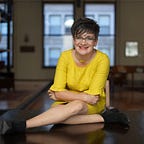Journalism and Civil Conversations: Truth and Consequences
Next week I begin a year-long journey in spaces that are both comfortably familiar and completely foreign to me: college campuses. I decided to write this piece, and subsequent pieces, as part of a series about this journey because walking onto campuses to help lead a new journalism initiative at this time of year, and particularly at this time in our country, feels in turns exhilarating, important and daunting.
I’ve spent the better part of my career as a journalist as an educator — formally at universities and conferences and informally as an editor, coach and mentor. But this project, Poynter’s pilot College Media Project, feels different.
In September, I’ll be visiting three college campuses selected from a competitive pool of 67 applicants solicited with help from Associated Collegiate Press. Applicants included large and small universities from New York to California. Each vied for an opportunity to add to students’ academic and journalistic workloads — to sacrifice party time and outside work time and even study time — to learn about accountability journalism and the role journalists can play in promoting civil conversations across differences in their communities.
The depth and the breadth of the 67 applications blew me away. Student editors described stories of campus protests — past and planned — that they want to cover accurately and responsibly. They shared their challenges in reporting about claims and charges of sexual assault within their institutions. They wrote of efforts to gain the trust of their audiences and the respect of their administrations. They detailed slashed budgets, decreased advertising revenue and confrontations with First Amendment bullies.
These students are hungry for insights and ethical guidelines. They want actionable tools to support their underfunded efforts as truth-tellers in an age when their work and dedication can quickly be dismissed as “fake news.”
They are, in short, a microcosm of modern American journalism.
I momentarily fantasized of expanding the pilot to five schools, or even six, but more rational colleagues prevailed, and we stuck with three schools for the first year. I forwarded my recommendations for the three pilot participants: Howard University, Virginia Tech and Iowa State.
Each school offers different opportunities for learning how this kind of a program might work on a larger scale; each also has a looming reporting challenge to address in the coming school year.
My role in the pilot is to serve as the lead educator and project coach. I’m co-planning an in-person training, and then organizing follow-up webinars and ongoing conversations with and across campuses as students plan and launch an accountability or civil conversation initiative on their campuses by the end of this school year.
I owe my involvement to Poynter’s Vice President for Academic Programs Kelly McBride, who knows not only my history and my teaching style, but also my heart.
For most of the last decade, I taught students and peers at the University of Cincinnati. I got to know generations of learners who had grown up with cable TV news the way I grew up with Sesame Street and Mister Rogers’ Neighborhood. My students didn’t remember a world before 9–11. Their America had always been at war, and social media was as essential to daily life as brushing their teeth. I often spoke to students, and to anyone else who would listen, about the challenges that these realities pose for journalism, both in theory and in practice.
With this project, Kelly offered me a chance to address some of the consequences of those realities: to help students understand the dangers of false balance in journalism as well as embrace the rights and responsibilities inherent in the First Amendment.
She also structured an innovative collaboration for the in-person training portion of the project, a connection with Essential Partners, a consultancy based in Cambridge, MA, that specializes in building constructive conversations across differences. I’ve been developing the on-campus segment of the project with Essential Partners’ Senior Associate Robert Stains.
When I first spoke with Bob, who has worked with many kinds of communities, including communities of journalists, we brainstormed how we might combine our work across disparate fields into a single in-person training session for college students. As he and I shared ideas and resources, we uncovered important parallels in our areas of work and its impact.
Together, we came to realize how being an effective facilitator can empower a journalist on deadline to think more about adding context and avoiding false equivalencies. We explored the myth of objectivity, the ladder of inference and the value of understanding why journalists prefer some sources rather than others. [Hint: It’s about more than quoting the first person to reply to your email or return your call.] We talked about the lost art of responsive conversation and the impact of digital communications on nuance, substance and accountability.
And we returned, again and again, to the value of reflection, to the importance of listening with intention and to the necessity of checking our own privileges and biases with every interview and every story.
Beyond the travel to Washington, D.C., Blacksburg, Va., and Ames, Iowa, I’m excited about where this project will take us in the weeks and months ahead. About the journalists I’ll meet and the stories we’ll share. About the plans we’ll shape together and the stories that will grow from those plans.
Join me as I document the journey through my posts here.
First training: Howard University, Sept. 8–9.
FULL DISCLOSURE: The Poynter College Media Project is sponsored by the Charles Koch Foundation. Since that might give some readers pause, and rightfully so, I want to be clear that the Koch Foundation played no role in the selection of colleges for the project or the development of the project’s curriculum. In addition, they do not have any authority over webinar topics, leaders or pilot participants’ projects on their campuses.
